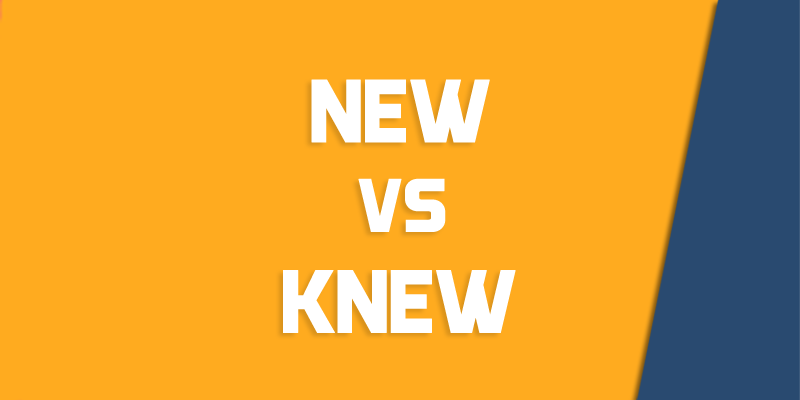New vs. Knew – What’s the Gist?
Although the word knew has the phonogram kn at the beginning of the word, these two English terms are pronounced exactly alike. The letter k is silent in this phonogram.
- New is primarily an adjective.
- Knew is the past tense of the verb know.
These two homophones have the same sound but different meanings and different spellings.

How to Use New in a Sentence
New definition: The word new is a modifier, functioning primarily as an adjective. When you add the –ly ending, making it newly, it then becomes an adverb.
As an adjective, new means to recently come into existence; to be novel or unfamiliar; to be in a condition for a short duration; or to have a beginning with a resumption or repetition of a previous thing.
For example:
- The new coronavirus has officially been named COVID-19. (Adjective)
- After being in the food service industry for years, he enjoyed using a different skill set at the new job. (Adjective)
- Because the winter had dragged on for so long, she was looking forward to a new season. (Adjective)
As mentioned, when you add an –ly ending to the word new, it becomes an adverb.
For example:
- The newly acquired furniture was off limits to the dog. (Adverb)
Something that is new is not very old.
How to Use Knew in a Sentence
Knew definition: Since knew is the past tense verb of know, let’s define the latter word. To know something is to perceive or understand it directly or to be aware of the truth/factuality of something.
For example:
- The high-school English teacher knows the grammar rules. (Present Tense Verb)
- Based on study and observation, the scientist knew that global warming is impacting and changing environments and habitats. (Past Tense Verb)
Outside Examples of New vs. Knew
- In a blog post last week, Dave Clark, Amazon’s senior vice president of worldwide operations, said it was adding the new jobs at its U.S. warehouses and delivery network because “our labor needs are unprecedented for this time of year.” –The New York Times
- Somebody’s Clothing Closet Ministry will host a Prom Dress & Elegant Attire Giveaway from 8 a.m. to noon April 4. Dresses, shoes and jewelry will be among the items offered. Donations of new or gently used dress-up attire will be accepted at the church. –Chicago Tribune
- The first week of February — that was Trump’s impeachment trial and my view was we knew what the outcome was going to be. So it’s irresponsible to spend all your time covering something that you can explain in two minutes and yet the other channels were absolutely wall to wall on this. Meanwhile, there was this epidemic rising in eastern China. And the Chinese who are pretty good at controlling their own population couldn’t get it under control. And that seemed very ominous to me . . . I was just enraged that no one was covering it. –Los Angeles Times
- I recently picked up a set of poker chips on sale. My son saw them and asked if he could host a game with his friends — no money involved. He told me which kids he wanted to invite and I checked with their parents, all of whom were fine with the idea. Only two knew how to play, so I taught them the rules and then settled in to deal. –The Washington Post
Phrases That Use New and Knew
There are several idioms that use the word new or knew, including:
A new lease on life: To have a new beginning which reflects more vivacity or better success with something.
- The woman was given a new lease on life when she divorced her spouse and moved to another state.
Brand spanking new: Something that is entirely and newly created or obtained.
- The adolescent received a brand spanking new PC for his birthday.
I knew it was coming: Someone feeling prescient that something is inevitably going to happen.
- After the young couple broke up, his mother replied, “I knew it was coming.”
Know something forward and backward: A statement revealing that the speaker is very knowledgeable and familiar about a certain subject.
- The sideline braggadocio explained the football game to the group of friends, acknowledging that he knew football forward and backward.
How to Remember These Words
Because the words new and knew sound exactly alike, it would be easy to substitute one for the other accidently. Since they are not synonyms, however, they are never interchangeable.
A helpful mnemonic would be to remember that the word knew starts with the same phonogram as know or knowledge: kn. Knowing that these words are related will help you pick the right homophone.
Quiz: New or Knew
- The toddler girl received a _______ toy for her birthday.
- After getting a different job, the employee had a difficult time figuring out her _______ computer.
- While watching the interchange between the teenagers, the mother _______ her son was interested in the girl.
- Just based on the darting of the eyes and the uncomfortable demeanor, the judge _______ the plaintiff was lying.
Article Summary
Is new or knew correct? These words have the potential of being confused since they are pronounced exactly the same. To choose the right one, ask yourself if you want an adjective answering the question “Which one?” If so, then pick the word new.
On the other hand, if you want the past tense of the verb know, then choose knew.
Obviously, it boils down to which part of speech you want to use in your writing.
- New is an adjective.
- Knew is a past tense verb of know.
Quiz Answers
- New
- New
- Knew
- Knew
